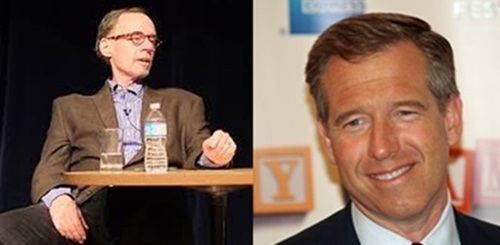Eight years ago, renowned New York Times media critic David Carr spent two years writing a brutally honest memoir -- The Night of the Gun -- in which he sought to investigate, as a reporter might, the events of his own life.
One of the most poignant moments comes when Carr goes to the home of his best friend Donald, bangs on the door and breaks a window. Carr remembers that Donald came to the door and pointed a gun at him.
Decades later when Carr interviews Donald about the incident, Donald says hesitantly, "I think you mighta had it."
Carr can't believe it: "That can't be true... I was never a gun guy," he argues with Donald.
Later, he interviews another friend, Chris, who remembers that Carr asked him to go remove a gun from his house when he had to move out quickly. Watch the video here.
"If I was wrong about the gun, what else was I wrong about?" Carr asks. He wrote in The Night of the Gun:
Memories are like that. They live between synapses and between the people who hold them. Memories, even epic ones, are perishable from their very formation even in people who don't soak their brains in mood-altering chemicals. There is only so much space on any one person's hard drive, and old memories are prone to replacement by newer ones.
A few days before he died, Carr wrote about Brian Williams:
I wrote a book some years back about the nature of memory and the stories we tell ourselves and others. Stories tend to grow over time and, if they are told often enough, they harden into a kind of new truth for the teller. Mr. Williams has been on almost every talk show you can think of and that requires not only a different skill set -- he is a gifted and funny performer -- but stories in abundance.
It's useful to note that Mr. Williams initially reported the story fundamentally as it had happened -- although the soldiers on hand say he exaggerated the danger to himself even then -- and over time, as he retold it, he moved into the middle of it, so that the story became something that happened to him. All those 1 percent enhancements along the way add up and can leave the teller a long way from the truth.
"But was it really all thus? When memory is called to answer, it often answers back with deception. How is it that almost every warm barstool contains a hero, a star of his own epic, who is the sum of his amazing stories?" Carr wrote in his memoir.
Scientific literature is filled with stories of false memories. Many people believe that the human memory works like a video recorder: the mind records events and plays them back exactly as they happened. On the contrary, according to an article in Scientific American, psychologists have found that memories are reconstructed, rather than played back exactly as we remember them. "The act of remembering is more akin to putting the pieces of a puzzle together than retrieving a video recording," said eminent psychologist Elizabeth F. Loftus, who gained fame when she conducted an experiment planting false memories of being a frightened child lost in a shopping mall.
I have no special respect toward celebrity news anchors like Brian Williams. They are pretend journalists -- highly talented newsreaders -- who read words that others put on the teleprompters. Their job is to convey the impression that they are uncovering the news. Nothing could be further from the truth.
In the same article about Williams, Carr wrote about the famed news anchor's appearance on the The Daily Show, including a very funny few minutes in August 2012:
Mr. Stewart was mocking something that had been on the NBC newscast, and Mr. Williams mentioned that sometimes when he is writing the show, he actually thinks of what Mr. Stewart will do with the same material.
"You don't write any of that stuff," Mr. Stewart said, laughing as he said it. "They take you out of the vegetable crisper five minutes before the show and they put you in front of something that is spelled out phonetically. I know how this goes."
So, everyone is in on the joke. It's all knowing winks and fake attacks on confected news read by people who are somewhat bored by what they do. It just seems less funny now.
In the 1987 prescient movie, Broadcast News, the anchor with no reporting or writing experience, played by William Hurt, gives advice to a brilliant reporter, Albert Brooks, on how to be an anchor: Sit on your coattails to give your jacket a nice line. Punch one single idea per story. And, most importantly: "You're selling them this idea of you. You're saying, 'Trust me, I'm credible.' "
Anchors have become the brand, readers, for stories that other producers and reporters uncover. The ability to convey credibility is everything.
The problem with Brian Williams is that he is a storyteller. The ability to tell a story is very important in every reporter and writer's life. But, Williams did not have the background in reporting and writing to temper his tall tales.
On Nightly News, he had a gaggle of producers and writers who could save him from his embellishments -- his memory distortions. But in all those talk shows and interviews William was on his own, caught up in his yarns. It seems NBC management loved his stories and encouraged him to woo a wider audience with his witty storytelling.
Ultimately these tragic flaws caught up with him, like a Shakespearian tragedy.

